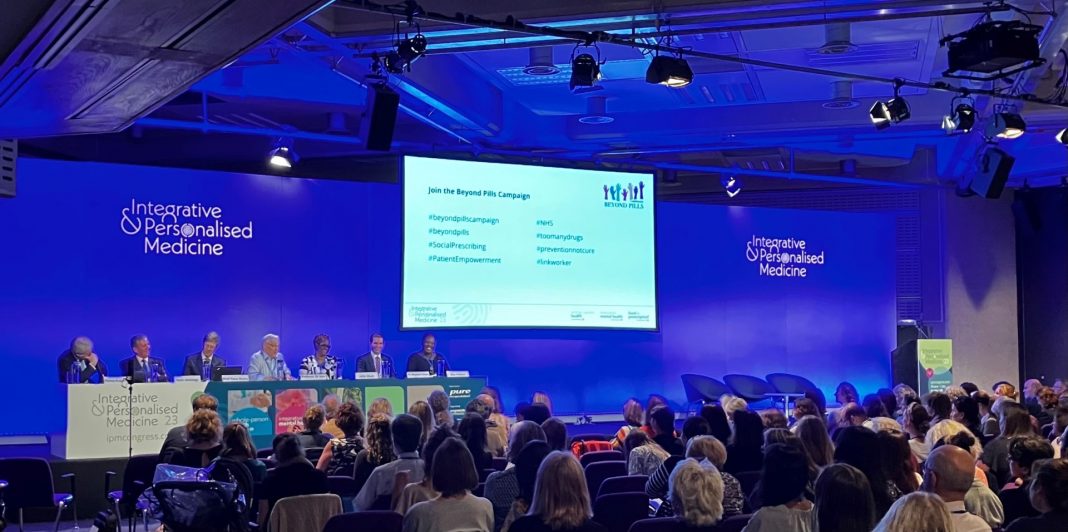A year on from the launch of the College of Medicine Beyond Pills Campaign, leading doctors, pharmacists, politicians and patients are convening today at the Whole-Person Health Conference in London to address the ongoing problem of unnecessary drug prescription. A nationwide lack of dedicated prescribed drug withdrawal services is exacerbating the suffering of millions of patients who have become dependent on drugs prescribed by their doctors for conditions such as depression, anxiety, insomnia and pain.
One in four adults in England is prescribed a potentially dependence-forming drug in any given year. While these drugs benefit some patients, a Public Health England review has called the situation ‘a significant public health issue’ due to serious levels of overprescribing of dependence-forming drugs in the community, with patients prescribed drugs beyond what clinical guidelines advise, or for concerns where there is no clear evidence of efficacy.
Vulnerable communities are particularly at risk, with prescriptions for antidepressants twice as high in deprived areas and opioids and gabapentinoids more often prescribed. The proportion of patients given at least a year of all dependence-forming drug prescriptions increases with greater deprivation and rates of prescribing are higher for the elderly and 1.5 times higher for women.
The launch of a new alliance
To tackle the issue, the College of Medicine Beyond Pills Campaign is joining forces with the All-Party Parliamentary Group for Prescribed Drug Dependence to promote integrated solutions to address the dangerous levels of over- and unnecessary prescribing within the NHS. The two campaigns will work together to develop a flexible integrated approach combining social prescribing (with psychosocial interventions where appropriate) alongside deprescribing to prevent and treat prescribed drug dependence.
The solution: an integrated approach with social prescribing
The process of social prescribing empowers people to participate actively in their own health, through trained link workers who have time to listen to patients and work with them to co-design a social, non-medical, community-based intervention in order to address long-term health conditions and specific issues including housing, debt management and benefits as well as anxiety, depression and loneliness. Most importantly, social prescribing plays a crucial role in addressing issues of social justice and health inequalities.
NHS England has recently published guidance to encourage health authorities to commission appropriate withdrawal services in their areas. Yet, no new funding has been provided for these key services nor for a national 24-hr helpline. In fact, in the past year, NHS Trusts have reined in their spending, leaving essential charities unable to provide withdrawal support.
Commenting on the launch, Danny Kruger MP, Chair All Party Parliamentary Group for Prescribed Drug Dependence, says: “Prescribed drug dependence is a public health crisis of the NHS’s own making, and yet there are still few services to help those who have been harmed, often with life-changing consequences for them and their families. This is why we are joining up with the Beyond Pills Campaign – to make sure that we do everything possible to stem the rising tide of prescriptions while providing dedicated support to those who’ve been harmed through no fault of their own.”
Leading the call for change, GP Dr Michael Dixon, Chair of the College of Medicine, says:“Today, pills are too often the first port of call for distressed patients and doctors short of time. Tomorrow, we must focus first on enabling people to find their own solutions with social prescription as the key. Only thus can we provide sustainable solutions for each person and create a sustainable and affordable NHS. Otherwise, waiting lists, the unending call for more staff and resources, and the numbers of medicine-dependent patients will simply go ever up and up.”
Dr Keith Ridge CBE, former Chief Pharmaceutical Officer for England and author of the Government’s National Overprescribing Review, added: “Overprescribing is being recognised across the world as a significant problem in patient care. While overprescribing is beginning to be addressed – not least by involving patients more in decisions about their health care and offering alternatives to medication – the College of Medicine Beyond Pills Campaign is crucial to maintaining momentum and awareness.”
GP Dr Henrietta Hughes, Patient Safety Commissioner for England, commented: “The College of Medicine Beyond Pills Campaign is vital. According to the National Overprescribing Review a shocking 10% of drugs dispensed in primary care are unnecessary or may even cause harm, and adverse drugs reactions account for 20% of in-patient hospital admissions in over 65s. Medication reviews are an important way to work in partnership with patients and keep people safe.”
Sir Norman Lamb, Chair of the South London and Maudsley NHS Foundation Trust and former Minister of State for Care and Support of Government of the United Kingdom, said: “I strongly support the Beyond Pills Campaign. It is so important that we change the culture of the NHS so that we focus more on how we prevent ill health and how we can better maintain wellbeing. Social prescribing should play a central role in our health system. Recognising the social determinants or causes of our ill health and seeking to help people confront those causes rather than resorting too readily to pills would do a lot for improving the health of our communities – and so reduce unsustainable demand on the NHS.”


